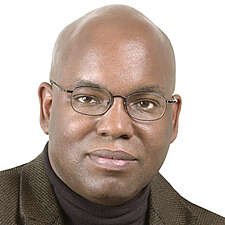Taking the Initiative to Push for Black Executives in Pittsburgh's Businesses
Even before the death of George Floyd in police custody changed the terms of the debate about systemic racism in America, Jessica Brooks was fed up with the status quo.
Taking the initiative to push for Black executives in Pittsburgh's businesses
Story by Tony Norman/Pittsburgh Post-GazetteAug 30, 2020

Even before the death of George Floyd in police custody changed the terms of the debate about systemic racism in America, Jessica Brooks was fed up with the status quo.
As CEO of Pittsburgh Business Group on Health, Ms. Brooks had already witnessed enough benign neglect and active hostility to the idea of diversity in Pittsburgh at the corporate and noncorporate levels to compel her to do something about it.
Executive Action & Response Network (EARN) is the brainchild of Ms. Brooks and co-founders George Robinson II and Martin Shepherd, local Black professionals who share a vision for making Pittsburgh’s corporate, academic and nonprofit spheres more responsive and welcoming to talented Black folks who have often felt marginalized here. Mr. Robinson is the director of supplier diversity at Pittsburgh health giant UPMC; Mr. Shepherd, a lawyer, is CEO of Arch Access Control, a cybersecurity company.
“The idea of EARN was forming long before we knew it would become EARN,” Ms. Brooks said. “My two co-founders and I attended a clay shooting event during the pandemic shortly after the murder of George Floyd.
“At that time, our focus was on what role we were to play to responsibly address the state of Black people in our country and in our region.”
The crushing reality of the Race and Gender Equity report published a year ago by the University of Pittsburgh followed by this year’s pandemic provided a gloomy context to the killings of Breonna Taylor, Ahmaud Aubrey and many other senseless tragedies that Ms. Brooks and her colleagues believe should move corporate America to positive actions far beyond sympathetic lip service.
The Pitt report catalogued racial inequities across every major category from workforce and education to health care and contact with the criminal justice system in Pittsburgh. The report’s conclusion was that this region is one of the most difficult in the country to live in for Black people, especially women.
Ms. Brooks participated in Zoom meetings and phone calls with fellow Black professionals in the region that asked not only basic questions like “How are you doing?” but the inevitable next question: “What are we doing?”
EARN was born out of many such discussions. Its birth reflects both the frustrations of the moment and the recognition of their responsibility as Black professionals to help provide a path forward. There’s an urgency now that everyone feels, according to Ms. Brooks.
“Time doesn’t operate now as it did pre-COVID[-19],” she said. “The expectation to problem solve and create at lightspeed is the new norm.
“Although EARN has been around a whopping nine weeks, we have mobilized very quickly and have a strong framework we are working within,” she said.
At the beginning of August, the group reached out to corporate Pittsburgh with a letter that bluntly assessed the situation with its much-reported lead sentence: “There is an emergency in Pittsburgh.”
The emphasis of the letter was on the recruitment and hiring of African American executives for C-suite and top executive roles. It called for a working group of CEOs to consciously plan for the end of systemic racism in Pittsburgh’s corporate culture.
There was also a call for expanded implicit bias and cultural sensitivity training that would include deep dives into the history of the impact of race on the economic fortunes of Black people.
“We have several leaders who have expressed support [for] EARN and who are in the midst of going through their own internal processes,” Ms. Brooks said. “Our goal is that the [corporate] leaders of this region will hold themselves and their peers to the highest standard of economic empowerment and well-being for African Americans in this region.”
Ms. Brooks lives in East Liberty with her husband and four children, but she grew up in Clairton, in the heart of the Mon Valley, so she’s seen the impact of economic displacement and discrimination up close.
Mr. Robinson is originally from Toledo, Ohio, and Mr. Shepherd hails from Cincinnati. All three are committed to expanding their network of Black corporate talent willing to spark hard and necessary discussions wherever they find themselves in the corporate landscape.
The reaction to EARN’s letter to corporate Pittsburgh has been mostly encouraging so far, Ms. Brooks said. It’s an informal network of many of the region’s Black executives so far and not an organization, per se.
“The public comments and financial commitments from corporate America were inspired by the public murder of a Black man,” she said. “The time has called for a focus on African Americans so that all executives of color, including Hispanics and Asian Americans, can thrive.”
She noted the gender and equity report on the region’s demographics outlined a harmful state of being for Black residents. “We must have a focus on this community. With that said, we stand with our brown peers in creating a culture that creates quality of life for us all.”
The only downside as she sees it so far is what she calls the lack of a unified voice among Black executives here and nationwide at a time when the country is most open to learning about the scourge of systemic racism and the part it has played at every level of our nation’s development.
Asked what advice she would give to Black executive talent contemplating a move to Pittsburgh, Ms. Brooks is both frank about current realities and encouraging about the potential here.
“Be [acutely] aware of the conditions and environment you’ll be entering,” she said. “Do your research. Pittsburgh has so much to offer, yet we as African American professionals and executives continue to lag behind our non-Black peers in many categories.”
She notes similar conversations are happening around the country.
Because a big part of EARN’s mission is the recruitment of African American talent to take positions of leadership in corporate, nonprofit and business, Ms. Brooks would encourage a move to Pittsburgh, but also advises that they make an informed decision and that they choose to be actively engaged.
“I’d also say, strongly consider moving to the city vs. the suburbs. I’d love to have you as my neighbor,” the East Liberty resident said.
Pictured: Jessica Brooks, CEO & executive director, Pittsburgh Business Group on Health.

Tony Norman COLUMNIST AND BOOK REVIEW EDITOR
@TonyNormanPG tnorman@post-gazette.com
Share This Story

Four Gateway Center
444 Liberty Avenue STE 1400
Pittsburgh, PA 15222


